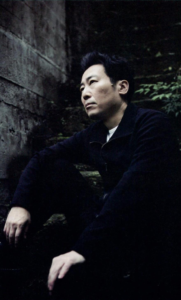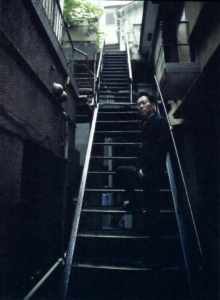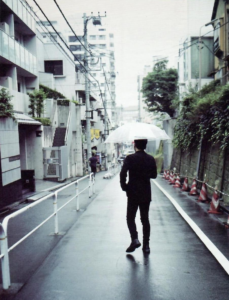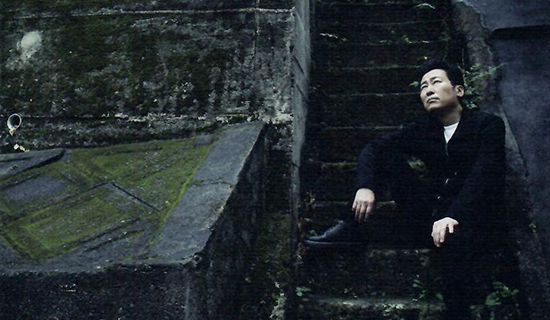It’s been 18 years since Game Center CX began airing, and cameraman Abe has stood before Arino Kacho from the very start, always filming. This is our first interview with him, touching on his varied interests such as bikes, cooking, and drawing! You can’t know Abe’s whole story without reading this!
Interview – Hayashi (Editorial Dept.)
Photography – Matsuzaki Hiroyuki (https://www.instagram.com/itl_mtzk/)
Born in a Town of Ruffians
I’d like to make this an interview where we dive into just what kind of person Abe, who’s filmed Arino Kacho for the last 18 years, really is. Thanks for agreeing to this.
(Abe) Thanks for having me.
I’ll ask you this since it’s the first time we’ve ever interviewed you, but you’re the same age as producer Tsuyoshi Kan, right?
(Abe) We’re the same age. If we weren’t, then I wouldn’t be able to talk so casually to him! (Laughs) No matter how you look at it, it would be rude if I was younger than him.
Were you in the same year in school?
(Abe) Yes. We were both born in 1964, the year of the dragon.
Were you born in Hakata, in Fukuoka?
(Abe) No, not in Hakata. If I said that, I’d make people from Hakata angry, and they’d say “No, that’s a totally different place.” It was a very rowdy place called Chikuho…Have you read “The Gate of Youth” (“Seishun no Mon”) by Hiroyuki Itsuki? It was really like that.
The coal mine ruffians.
(Abe) They weren’t just regular ruffians. One tenth of my classmates’ parents were yakuza.
Wow! Seriously!?
(Abe) Seriously. That’s why in grade school, friends’ parents would get killed maybe once every six months. It was a world where we regularly attended funerals.
What kind of kid were you in such a ruffian-filled town?

(Abe) I wasn’t the kind of punk type that all the fans of the show have characterized me as! (Laughs) I was smart, good at drawing, quick-witted, and I didn’t get into fights. It’s just that my dad was scary, even though he wasn’t in the yakuza or anything. That’s why the scary upperclassmen were careful around me. If they spoke to me too rudely, my dad would come and yell at them! (Laughs)
(Laughs) And what was your mother like, who married such a heroic man?
(Abe) I guess my dad was a real rich kid growing up, his dad managed a coal mine or something. My dad and my mom had an arranged marriage, but she was totally a rich girl until the day she died. She didn’t know anything about the rigors of society, but she was a great cook. Our meals were always delicious. Maybe I like cooking so much because of that.
It’s all because of your mother.
(Abe) But the biggest reason for that is that a girl I dated around when I was 28 was a really great cook too! (Laughs) Like, so good that it was shocking. She made her own century eggs.
Can normal people even make century eggs?
(Abe) She was Taiwanese, so the Chinese food that she made was amazing. And as a cameraman, I’ve worked on a lot of gourmet cooking show sets. I’ve eaten cooking from all sorts of famous chefs, but her cooking surprised me the most. It’s the base of my taste for Chinese cooking.
That’s amazing, these stories are just getting deeper and deeper.
(Abe) Are they deep? Then should I tell you about a ritual used to test your courage when I was a kid?
Huh? What kind of ritual?
(Abe) There was a river in my neighborhood called the Onga River, and the water would get really high when there was a typhoon. We’d swim to the bank on the other side during that.
Oh no no no, there’s no way! You’d die! (Laughs)
(Abe) You’d normally imagine being swept away diagonally and carried downstream, but I was really good at swimming, so I barely managed to swim straight across.
That’s…amazing!
(Abe) I had a friend that we called T-kun, and he got swept away by the tide. We rode alongside him on our bikes and shouted, “Are you okay?!”, and he just waved back at us with this huge grin on his face! (Laughs) As he was being carried along in this muddy stream that looked like a café au lait. He was able to grab onto a handrail on a bridge though. It would have been awful if he’d been swept away like that.
That sounds very thrilling! (Laughs) I wasn’t born until 1970, but we didn’t have any horrifying customs like that.
(Abe) It was kind of horrifying, wasn’t it.
First Motorcycle and Treasured Moments of Riding in the Wind
Taking a step back, people often say that you have a ruffian quality about you. But you’re saying that you weren’t that kind of kid.
(Abe) I was always on the student council and such in middle school, so I had really good grades. I was good at drawing too.
You’re still good at drawing now, but you were good at it way back then?
(Abe) From all the way back in kindergarten. Some of my drawings were selected to be shown at an exhibition at the Fukuoka Prefectural Museum of Art, and then they went on to be shown nationally. As I gained more experience, I gradually learned how to draw in a way that was easier to get my pieces into contests. That’s why I was usually confident that they’d be accepted. Then there’s motorcycles, I bought my first one in my third year of middle school.
Are you even allowed to ride a motorcycle in your third year of middle school? (Laughs)
(Abe) I was able to buy one, I just couldn’t ride it yet! (Laughs) It was a Honda Hawk II that I bought from an upperclassman for 30,000 yen. So when I turned 16, the first thing I did was go get my license. Riding through the fields of rice paddies was really fun. They were straight paths, so that’s why I think that when I die, the last thing I’ll see is myself going through those in low gear.
It’s one of your most treasured moments.
(Abe) It is. Then I went into high school, and I took out a loan to buy a Suzuki GSX 400E. Even though it was a demo vehicle that was being sold like new. That bike took me to all sorts of places, like Icarus’ wings. I rode to Kyushu during spring break in the second year of high school, and it was so much fun. And it went all over Japan during the summer of my third year.
You were very active.
(Abe) I had some relatives that lived on the Noto Peninsula, and they ran a lodge there. So I raced all around the Sea of Japan and worked part time at their place on the Noto Peninsula. Then on August 31st I got a bit lost when I went out near the Sea of Japan from there. Kyushu is right from there, but I just kept going left. I got an extra month off from school. My mom told them that it was my appendix. She was a proper lady, so they didn’t doubt her at all! (Laughs) That’s why it was a time in my life when I was able to experience a lot of different things.
The Birth of Cameraman Abe
So that was what your youthful days were like. What happened after you graduated high school?
(Abe) I went to a photography focused trade school.
Ahh, so it all started with photography then.
(Abe) I originally wanted to get into drawing. But even though my work made it into exhibitions, I realized as a kid that they wouldn’t cut it in the professional world. So then I thought, “Well wouldn’t I be able to express all sorts of things about myself through photography?” Drawing is fundamentally based around artistic ability, right? I couldn’t make it through that alone, but I trusted my instincts. So I went into photography, thinking I could make it that way. At first, I started out using the camera I had at home, but in my third year of middle school…do you know the Ricoh “Sankyuppa”?
Basically the “Sankyuppa” represents the fact that it cost 39,800 yen, right?
(Abe) That’s right. Back then they had a commercial for the Ricoh Sankyuppa, which was the Ricoh XR500 camera that came with a lens for 39,800 yen. I bought that from a local camera store. The guy who ran that store taught me all sorts of things, and then I joined the photography club. Following along from before, my photos started getting picked up for exhibitions.
And that’s the path that led you today, more or less?
(Abe) Yes, but I was still living out in the country. In these sorts of places, you didn’t really have access to much information at all. You didn’t have the Internet like you do now, and nowhere was really selling books about this stuff. So I had to find a photography trade school on my own. My teachers in high school would say things like “Does a place like that even exist?” or “I don’t know of anywhere like that” when I asked them, so I was at the point where I just had to research it myself. There was a job section in a magazine called Commercial Photo that I read to get some ideas, but I just wasn’t sure where to go from there. I enrolled in the Kyushu branch of Tokyo College of Photography in Fukuoka, but I quit after a year.
Oh no, after only a year?

(Abe) I quit when it came time to figure out if I was going to enroll for a second year or not. I’d built up a decent career before even enrolling. I won contests, I was working as an assistant, etc. I was feeling good about myself and figured that would get me by. And not to mention that entire school was made up of old guys who were like “I was a chef until a little while ago, but then a fortune teller told me to be a cameraman” Or other guys who were like “I just bought my first camera after enrolling here!” It was nothing but people like that! (Laughs) So going to that school was just pure agony. Then I took another look at Commercial Photo and I got into a photography company in Fukuoka as an assistant.
Your start as a career cameraman was still photography, right? What made you want to get into filming motion?
(Abe) There was a show with Katsuya Kobayashi called Best Hit USA.
Ahh, that was right around the MTV boom.
(Abe) I really loved that show and thought it was so cool. That made me want to get into shooting motion, so I found a job with a production company that did the programming for Fukuoka RKB (Mainichi Broadcasting). It was out in the country, so I got the half-hearted compliment of “Abe, you do still photography, so your composition is pretty good” (Laughs) Then I worked on local fishing programs and such, which was a lot of fun.
What happened that made you want to relocate to Tokyo?
(Abe) I was still out in the country, right? I figured Tokyo was where all the media jobs were at. There was this TV Tokyo program that I always used to watch in Kyushu at that time. It was a program about motorcycles, but it was really cool. It was a 15-minute show narrated by Jon Kabira that would just show Yamaha auto bikes and marine sports set to music. The show was called Yamaha On and Off, and I think it was aired late at night. But I found the name of the production company during the end credits and called them. It went off without a hitch.
So then you moved to Tokyo.
(Abe) But then I saw the difference in efficiency with my very eyes. I’d only worked as an assistant in Fukuoka for half a year. I sort of became a cameraman by chance because someone told me to pick it up and use it. I had no real experience in handling different situations. The person I was an assistant to in Fukuoka had plenty of senior co-workers there, but since they never had a chance to teach me about the particulars of filming or methods of expression, I had to think about these sorts of things all on my own. I came to Tokyo with these attitudes and a totally different way of doing things. And since they had a totally different way of taking responsibility for things too, I felt like I was going to cry every single day. I’d get nothing but complaints from the production side.
I had no idea you went through such a tough time. Incidentally, how old were you at the time?
(Abe) I was 24. But ever since I was a kid, I really understood the idea of “You really want this, right?” And because I was the type to understand the idea of “If you do this, you’ll get popular, right?” in this context, it makes it so I can really respond well to that sort of thing. And by doing that, I earned the trust of the people around me. I became known for using Kyouya Kobayashi’s new expression method to show differentials.
Meeting Producer Tsuyoshi Kan and Game Center CX
Those were your first steps toward becoming a cameraman, but did Tsuyoshi Kan come into the picture right around then?
(Abe) That’s right, but he came to Tokyo a little bit later. I think it was sometime in my 30s, and I’d been kicking around the area for a bit! (Laughs) I went with Kan to do an interview at the Self-Defense Force. Thinking that he must be feeling lonely since he probably came all the way from Osaka, I said, “We’re the same age, aren’t we?” and we ended up becoming really close! (Laughs) And it just developed from there.
And that takes us to Game Center CX, but the very first interview on that show was at our very own company, Ohta Publishing. Were you there for that?
(Abe) I was. That was the Taito episode, right?
It was the Taito episode. I met Arino for the first time during the conversation about the Takeshi’s Challenge strategy guide. He was pretty shy! (Laughs)
(Abe) He basically hadn’t even talked to most of the other staff members during that first season. I don’t think I talked to him at all. I’d only said things like “Stand over there please” to him. Arino didn’t come to the post-program launches, after all.
Opportunities to be around Arino became more plentiful as the show went on, but was there ever anything that made you think “He finally opened up to me?”
(Abe) The first time was probably during The Hot Spring Game Travelogue? I mean, we were all together there on location for two days. And maybe the overseas shoots for the Tamage segment. But maybe we really started being friendly with each other during the Hokkaido trip? Since there were only five of us there filming all of that: Kan and I, along with Tojima, Arino, and Arino’s manager. When we first got to the airport, the car that Tojima had rented was just a regular sedan! (Laughs) I said, “There’s no way we can all fit in there with this much luggage!” So then we rented a bigger car and Kan and I took turns driving. The trip was very haphazard, though. We’d planned out our destinations, but we’d stop off at random places that looked interesting.
It was very imprecise! (Laughs)
(Abe) It was very imprecise. It very much felt like a “What should we do on Wednesday?” kind of situation. But that part was the most fun. It felt like that’s where Arino really opened up.
The time that really sticks with me is when no one could bring themselves to hit the reset button when the time for the Ninja Gaiden challenge got extended, but you were able to with no problem whatsoever. I thought to myself that no one would have been able to do it if it hadn’t been for you.
(Abe) I mean, don’t you think everyone wanted to just hurry up and go home already? Suda, one of the engineers on our tech team at the time, lived really far away. He was always so nervous. He couldn’t catch the last train home if we finished up too late, so I feel like he was always thinking “Let’s hurry up and be done already!”
You’ve seen Arino play a lot of games at this point, but is there one challenge that sticks out for you?
(Abe) There are so many of them that have been funny. But the one that really made me crack up was the Jogging Race game in Family Trainer. AD Katayama was using the pad on his tiptoes like a penguin, and I was laughing so hard that my stomach hurt! (Laughs) I could barely even open my eyes. It was like “Who taught him to run like a penguin?!” Also, there was Tojima blocking out the sunset.
During Ninja Gaiden! (Laughs) That was a classic.
(Abe) I actually thought “Why is he just standing still over there?” (Laughs) He was told to do it, but I couldn’t believe he actually did. Tojima really is funny though. Whatever he does is hilarious. That sort of uncalculated, natural humor is amazing. It’s therapeutic, in a way.
Which game was the most difficult for you to make it through?
(Abe) It was Super Mario RPG. I honestly thought I was going to die; it was painful filming it for that long. I’d just be thinking “This again today?!” It was tough for Arino too, I think. He starts eating sweets when he gets tired. And I don’t know if it was to admonish himself or if the director noticed and tried to get him to stop, but he just kept eating more.
Things get dangerous when the Kacho starts eating sweets! (Laughs)
(Abe) And that’s why I point out when he’s doing it. I’m indirectly saying to everyone “Do something about it!” You have to give him a hint or make him take a break. Because isn’t that just his way of saying “I’m out of motivation”?
Kiyoshi Tane, one of the writers, fell asleep during Princess Tomato in the Salad Kingdom! (Laughs) Were there any times that you just fell asleep without thinking about it?
(Abe) Not lately. I didn’t sleep during Super Mario RPG, but I made sure no one could see that I was messing around on my phone the entire time! (Laughs)
(Laughs) That’s absolutely something you shouldn’t do, right?
(Abe) That’s right. Even at the time, I thought I shouldn’t be doing it. But RPGs are really tough to get through sometimes.
A Place That You Go to Meet Friends
Regarding this interview, I posted to Twitter that I was looking for questions that people would really like to ask you. I got a lot of responses…but we’ll go with this one: Is there a specific angle to film Arino Kacho from that you think makes him look really cool?
(Abe) Yes…from the bottom right. If you’re asking about angles, I guess I’d just say the bottom right.
I see. I’ll tell the cameraman to get him from the bottom right when he’s shooting for the cover of this issue! (Laughs) And since I already asked you a lot of motorcycle questions, let’s go with this one: What’s are some of your favorite recipes?
(Abe) If we’re talking recently, it would probably be chicken skin wraps with yuzu ponzu dressing. In Hakata, chicken skin skewers use skins from the bottom part of the neck, where it’s very tender. You slowly fry that in a pan and put yuzu ponzu dressing on it. The yuzu should be the grated kind. It has a strong fragrance, and I’ve been really into making it lately. I also make namerou (a type of finely minced meat with seasonings, like a tartare) all the time. Horse mackerel namerou, to be specific. It goes well with alcohol and rice, and I put a lot more effort into mine than the kind you can just buy at the store. It’s so good that I think it would surprise you if you ever try it.
That sounds like something I’d like to try!
(Abe) I was supposed to make something for the recent Game Center CX 300th Episode Special, but I couldn’t. I tried out a Basque cheesecake recipe that I’d really recommend. It’s easy to make and very difficult to mess up.
Once COVID isn’t an issue anymore, please make some sweets for the next live broadcast! (Laughs) Alright, one last question: What does Game Center CX mean to you?

(Abe) It’s a place that I go to meet friends twice every month. At least that’s what it feels like to me.
So you are all friends after all.
(Abe) I mean I’ve seen kids who were basically useless as ADs go on to be directors and parents. And it’s not just people who work for Gascoin and the production staff, even people who work in management have fun. That’s the great part about this show. It feels like we’re not just there to see a game being cleared. How to put it…we’re all getting together to play games. It’s a bunch of old guys talking, it’s having meals together…and I guess the next step would be all taking a bath together. Should I make my own bathhouse? (Laughs)
That sounds great, the Abe Bathhouse! (Laughs)
(Abe) We’d all get in and say “Great work today! See you all again in two weeks!” (Laughs)
